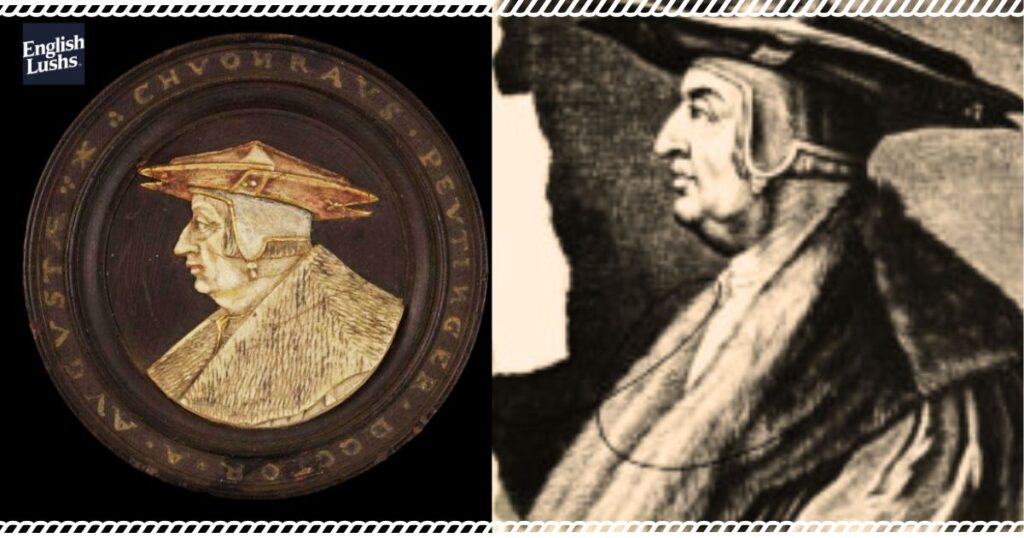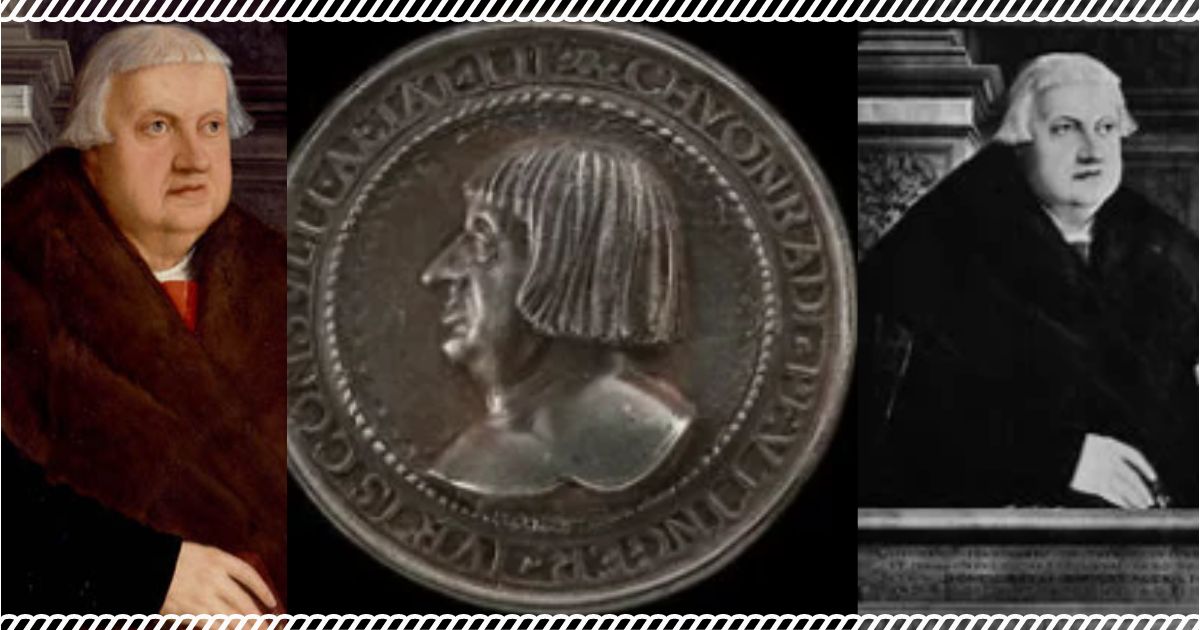Conrad Peutinger II, born in 1465, was a prominent Renaissance figure. His contributions spanned various fields of study. Peutinger’s work influenced cartography, humanism, and diplomacy.
His legacy endures through his scholarly pursuits. The Peutinger Table remains his most famous contribution. This article explores Peutinger’s life and achievements.
Conrad Peutinger II 1475 Early Life and Education
Conrad Peutinger was born in Augsburg, Germany. His family was influential in local politics. Young Conrad received a comprehensive humanist education.
He studied at prestigious Italian universities. Peutinger’s education focused on classical languages and literature. This foundation shaped his future scholarly pursuits.
Conrad Peutinger Influence of the Renaissance
The Renaissance greatly impacted Peutinger’s worldview. He embraced the revival of classical learning. Peutinger sought to apply ancient wisdom to contemporary issues.
His work bridged medieval and modern thought. Peutinger’s contributions reflect Renaissance ideals of humanism. He championed the importance of classical knowledge.
Conrad Peutinger II 1475 Peutinger’s Role as a Humanist
Peutinger embodied the Renaissance humanist spirit. He devoted himself to studying classical texts. His work aimed to revive ancient knowledge.
Peutinger’s humanist pursuits were wide-ranging. He explored literature, history, and antiquities. His scholarship influenced contemporary intellectual circles.
Conrad Peutinger II 1475 Peutinger’s Career in Diplomacy and Politics
Peutinger served as Augsburg’s city secretary. He represented Augsburg in diplomatic missions. His political career spanned several decades.
Peutinger’s diplomacy skills were highly regarded. He negotiated on behalf of Augsburg. Peutinger’s political influence extended beyond his city.
The Peutinger Table: An Ancient Map of the Roman Empire
The Peutinger Table is Peutinger’s most famous association. It’s an ancient Roman map he discovered. The map depicts the Roman road network.
Peutinger recognized the map’s historical significance. He worked to preserve and study it. The Peutinger Table revolutionized understanding of Roman geography.
The Importance of the Peutinger Table
The Peutinger Table provides unique historical insights. It illustrates the extent of Roman infrastructure. The map reveals ancient trade and military routes.
Scholars still study the Peutinger Table today. It offers valuable data on Roman civilization. The map’s importance in historical research endures.
Peutinger’s Contribution to Cartography
Peutinger’s work advanced the field of cartography. He studied and preserved ancient geographical knowledge. Peutinger’s efforts improved contemporary mapping techniques.
His approach combined classical and modern methods. Peutinger promoted accuracy in geographical representations. His work influenced future cartographic developments.
Peutinger’s Library: A Repository of Classical Knowledge
Peutinger amassed an impressive personal library. It contained rare manuscripts and ancient texts. The library was a treasure trove of classical knowledge.
Scholars from across Europe visited Peutinger’s library. It became a center for humanist study. Peutinger’s collection preserved many important works.
Conrad Peutinger II 1475 Peutinger and Roman Antiquities
Peutinger had a passion for Roman antiquities. He collected and studied ancient artifacts. His research advanced understanding of Roman culture.
Peutinger’s antiquarian interests were wide-ranging. He studied inscriptions, coins, and architecture. His work laid foundations for modern archaeology.
Conrad Peutinger II 1475 Peutinger’s Contributions to Roman Epigraphy
Peutinger made significant contributions to Roman epigraphy. He collected and transcribed ancient inscriptions. Peutinger’s work preserved valuable historical information.
His epigraphic studies were methodical and comprehensive. Peutinger established standards for inscriptional analysis. His efforts advanced the field of epigraphy.
Conrad Peutinger II 1475 Peutinger and the Renaissance Circle in Augsburg

Augsburg became a Renaissance intellectual center. Peutinger was at the heart of this circle. He fostered connections between scholars and artists.
Peutinger’s home hosted regular scholarly gatherings. He encouraged the exchange of ideas. Peutinger’s circle influenced Renaissance thought in Germany.
Conrad Peutinger II 1475 Peutinger’s Relationship with Emperor Maximilian I
Peutinger developed a close relationship with Maximilian I. He served as an advisor to the emperor. Peutinger’s influence extended to imperial politics.
Maximilian valued Peutinger’s scholarly expertise. He entrusted Peutinger with important diplomatic missions. Their relationship benefited both scholarship and politics.
Conrad Peutinger II 1475 Peutinger’s Role in the Holy Roman Empire
Peutinger played a significant role in imperial affairs. He participated in key political negotiations. Peutinger’s diplomatic skills were highly valued.
His understanding of history informed his political work. Peutinger advised on matters of imperial governance. He helped shape policies within the empire.
Conrad Peutinger II 1475 Peutinger and the Printing Revolution
Peutinger embraced the new technology of printing. He used it to disseminate classical texts. Peutinger’s publications reached a wide audience.
He saw printing’s potential for scholarship. Peutinger supported printers in Augsburg. His efforts advanced the spread of knowledge.
Peutinger’s Published Works
Peutinger authored numerous scholarly works. His publications covered various subjects. They reflected his broad intellectual interests.
His works included historical and legal texts. Peutinger also published on antiquities and geography. His publications influenced contemporary scholarly discourse.
Read This Blog: Spencer And Sondra Wallace Olathe: A Legacy Of Community Impact And Philanthropy
Conrad Peutinger II 1475 Peutinger’s Correspondence with Leading Humanists
Peutinger maintained an extensive scholarly correspondence. He exchanged letters with leading European intellectuals. This network facilitated the exchange of ideas.
His correspondence covered diverse scholarly topics. Peutinger discussed new discoveries and interpretations. His letters are valuable historical documents.
Peutinger’s Influence on Renaissance Thought
Peutinger’s work significantly influenced Renaissance scholarship. He promoted the revival of classical learning. Peutinger’s ideas shaped humanist thought.
His research methods were innovative and thorough. Peutinger encouraged critical analysis of ancient texts. His approach influenced future generations of scholars.
Conrad Peutinger II 1475 Peutinger’s Legacy in Cartography
Peutinger’s cartographic work had lasting impact. He preserved and studied ancient geographical knowledge. Peutinger’s efforts advanced understanding of historical geography.
The Peutinger Table remains his major contribution. It continues to influence cartographic studies. Peutinger’s work laid foundations for modern mapping.
The Peutinger Table’s Influence on Modern Cartography
The Peutinger Table inspired modern cartographers. It demonstrated the importance of historical maps. The table’s unique format influenced map design.
Scholars still analyze the table’s content. It provides insights into ancient geography. The Peutinger Table remains relevant in cartographic studies.
Conrad Peutinger II 1475 Peutinger’s Influence on German Humanism
Peutinger was a key figure in German humanism. He promoted classical learning in Germany. Peutinger’s work inspired other German scholars.
His scholarly approach was distinctly German. Peutinger combined humanism with practical concerns. He helped establish a German humanist tradition.
Conrad Peutinger II 1475 Peutinger’s Family and Personal Life
Peutinger married Margarete Welser in 1499. They had a large family together. Peutinger balanced his scholarly pursuits with family life.
His home was a center of learning. Peutinger educated his children in humanist traditions. His family continued his scholarly legacy.
Conrad Peutinger II 1475 Peutinger’s Death and Posthumous Recognition
Peutinger died in 1547 in Augsburg. His death marked the end of an era. Peutinger’s contributions were widely recognized posthumously.
Scholars continued to study his work. Peutinger’s library became a valuable resource. His legacy influenced future generations of humanists.
Peutinger’s Enduring Impact on Scholarship
Peutinger’s influence extends to modern scholarship. His work laid foundations for various disciplines. Peutinger’s approach to study remains relevant.
His contributions span multiple fields of study. Peutinger’s legacy continues to inspire researchers. His work remains a subject of scholarly interest.
Frequently Asked Questions
What is Conrad Peutinger II most famous for?
Conrad Peutinger II is most famous for discovering and preserving the Peutinger Table, an ancient Roman map.
How did Peutinger contribute to Renaissance humanism?
Peutinger contributed to Renaissance humanism through his scholarly work, promotion of classical learning, and extensive library.
What was Peutinger’s role in Augsburg?
Peutinger served as Augsburg’s city secretary and represented the city in diplomatic missions.
How did Peutinger influence cartography?
Peutinger influenced cartography through his study of ancient maps and promotion of accurate geographical representations.
What was Peutinger’s relationship with Emperor Maximilian I?
Peutinger served as an advisor to Emperor Maximilian I and played a significant role in imperial politics.
Conclusion
Conrad Peutinger II was a Renaissance polymath. His contributions spanned multiple fields of study. Peutinger’s work in cartography, humanism, and diplomacy endures.
The Peutinger Table remains his most famous legacy. His scholarly approach influenced future generations. Peutinger’s impact on Renaissance thought is undeniable.

Amelia is a skilled SEO expert with a strong focus on content writing, keyword research, and web development. With a dedication to delivering results, she helps businesses optimize their online presence and drive organic growth.
Her expertise ensures that clients stay ahead in the ever-evolving digital landscape












